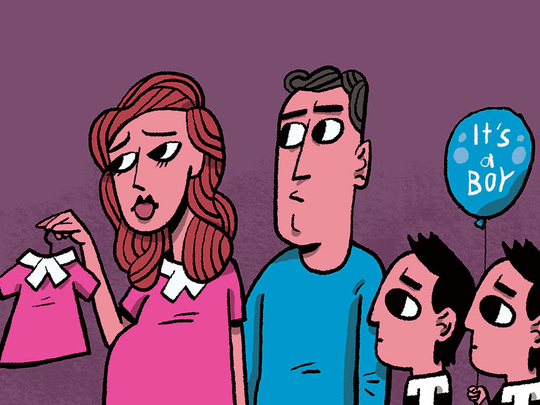
For those not following the lives of footballers’ wives, news that Coleen Rooney, married to the errant Wayne, gave birth to their fourth child last week may have passed you by.
But the fact that this is not just their fourth baby, but their fourth boy — Cass joins older brothers Kai, eight, Klay, four, and Kit, two — has brought one of the last, and most persistent, parenting taboos back to light.
Over the years, 31 year-old Rooney has played down any longing for a daughter. “I honestly don’t mind,” she told Hello. “But a girl would be nice to complete the family, of course.” And it is that coda, “of course”, that speaks volumes. When it comes to pregnancy, a healthy baby is the only benchmark, no one is supposed to want more. But skim any online parenting forum and you’ll see a different story. Anonymously, people are admitting they do want a baby of a certain sex. Feelings range from a strong preference to a burning desire; for some, it goes so far as to reach desperation. The phenomenon is dubbed “gender disappointment”.
A recent survey by online parenting community, Channel Mum, found a quarter feel “very disappointed” if their child isn’t their hoped-for sex. Three per cent said it affected their ability to bond in the long-term and twice as many admitted that they’d consider travelling abroad for gender selection, which is banned for non-medical reasons in the UK.
Paul Rainsbury, a UK fertility specialist who has run The Rainsbury Clinic (genderselection.uk.com) in London for more than 20 years, isn’t surprised. As a medical facilitator he helps patients access a sex selection procedure called pre-implantation genetic diagnosis (PGD) abroad — and business is booming.
He has seen an “exponential” year-on-year growth in inquiries from British couples about PGD, with many of those now specifically citing gender disappointment, something he wasn’t seeing even three years ago. How strong is the desire? “It’s visceral. On a scale of one to 10 I’d put it at an eight or nine.” It would have to be. Patients must be prepared to travel (Belgium, the USA and Mexico allow PGD for family balancing) for a full IVF cycle at a cost of £11,000 (Dh56,663) a try. This, combined with the taboo surrounding the entire subject, means most keep it a secret from even their closest relatives.
Emily Mann understands that drive. She had imagined herself as a mother of daughters from day one; a dream so real - “I’d named her, planned her nursery,” — that when she found out she was having a second son in 2015, she left the 20-week scan in tears. “I could only speak to very close friends and my partner Aaron about the way I was feeling. To anybody else I didn’t want to come across as selfish or ungrateful. But I was heartbroken.” It’s a rollercoaster very familiar to Jayne Ford, 49. Having always wanted a big family, she and husband Richard, 51, a computer engineer, were delighted by the arrivals of Elliot, now 26, Ben, 24, and Max, 23. It was only when they discovered that they were expecting their fourth — Oliver, 22 — that gender disappointment truly kicked in.
Sex selection
“In that scan room I just knew we’d be trying again,” says Jayne. “I loved my children so much and I knew I’d love this baby just the same. But for some reason it wasn’t enough to have just boys. I really needed a girl.” Then disaster struck. After Oliver was born, cysts on Jayne’s Fallopian tubes meant one had to be removed, leaving her grieving for the girl she might never have. Conceiving one became an obsession.
“I loved my boys desperately but seeing mothers and daughters everywhere was so difficult, it was like a blow to the heart. I felt jealous, sad and angry. I even talked to a specialist about sex selection abroad but it was so expensive. And how would the boys have felt if they found out I’d paid to have a daughter, when I already had them?”
Counselling provided the only outlet where she could speak openly. But while it gave her a place to cry, it didn’t alleviate the yearning. Which is why, when she fell pregnant with Simon, now 18, Jayne felt relief. Yes, it was a fifth boy, but she could still get pregnant, which meant her dream of a daughter wasn’t lost. “In that scan room I looked at Richard and said, ‘You know we’ll have to try again.’ I knew this was my last chance, so I went all out.”
That meant trying a method called “gender swaying”, which involves dietary changes and carefully tracking ovulation. “We had to have sex earlier in my cycle than usual, following the theory that female sperm are slower than male. It was like a military operation.”
It paid off. When she heard the news she was finally having a girl she cried so much that doctors were worried. “It was elation and disbelief. In that second, the angst I’d carried for so long just dropped away.” Phoebe is now 17 and Jayne has worked hard to make sure all her children know they are equally loved. She’s also learnt just how similar parenting both sexes can be. “I had preconceived ideas that somehow I’d have a closer relationship with a girl, but I’m just as close with the boys. That has surprised me.”
As for Emily, mother to Elliott, three, and Casey, two, she recognises “it’s OK to be sad, to ‘mourn’” the daughter she will never have. “But I’m completely head over heels in love with my two wonderful boys,” she insists, “and if it were possible to do so, I wouldn’t change them.”
— The Telegraph Group Limited, London 2018
Kate Graham is a freelance journalist.









